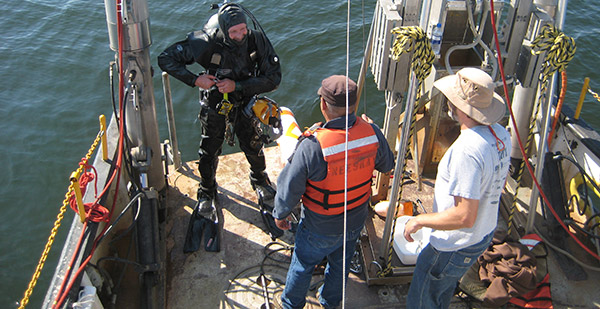
MILWAUKEE – Two researchers from the University of Wisconsin-Milwaukee (UWM) have been awarded grants from the University of Michigan (U-M) Water Center for two of eight projects aimed at restoring and protecting the Great Lakes.
J. Val Klump and Sandra McLellan, both faculty members in UWM’s School of Freshwater Sciences, have together secured more than $750,000 of the $2.9 million total grant funding, the U-M Water Center has announced.
In addition to the two projects from UWM and one from UW-Madison, the multidisciplinary teams receiving Water Center grants are led by researchers at universities in Michigan, Indiana, Minnesota and New York. The eight projects were selected from 90 submitted proposals.
Special emphasis was given to proposals that integrated one or more focus areas of the federal Great Lakes Restoration Initiative — cleaning up toxins, combating invasive species, restoring habitat and ridding near-shore waters of polluted runoff — or that evaluated the potential effects of climate change on Great Lakes restoration efforts.
In all cases, the funding will be used to support existing efforts in the Great Lakes, not to establish new projects.
Klump project:
Green Bay has been plagued for decades by algae-promoting nutrients flowing into its southern end and causing oxygen-starved regions known as hypoxic zones. Climate models project warmer and wetter conditions for the region in coming decades, with shorter winters, reduced ice cover, increased runoff — all of which can exacerbate hypoxia. This project will integrate watershed and lake computer models to test how current restoration efforts will perform under climatic changes and to determine if additional actions are needed to achieve restoration goals for the bay. Other investigators: Hector Bravo, UWM and Kevin Fermanich, UW-Green Bay
McLellan project:
This project will assess sewage and agricultural runoff entering lakes Michigan and Erie and determine the relative contributions of sources contributing to fecal pollution in each lake. The information will be used to refine a watershed assessment tool that can be used across the region as a simple and cost-effective detection method for sewage contamination. Other investigators: Hector Bravo, UWM and Steve Corsi, U.S. Geological Survey
Part of the Graham Sustainability Institute, the U-M Water Center was established with a $4.5 million, three-year grant from the Fred A. and Barbara M. Erb Family Foundation and additional funds from the university.
The Great Lakes hold 20 percent of the world’s freshwater. The region includes more than 10,000 miles of coastline and numerous rare plant and animal species. In addition, the Great Lakes support a wide range of recreational and economic activities, including tourism and a sport fishing industry that contributes $4 billion to the national economy.
Detailed descriptions of the projects are available at: http://graham.umich.edu/water/projects/tier2
###
(CONTACT: J. Val Klump, 414-382-1715, vklump@uwm.edu, or Sandra McLellan, 414-382-1747, mclellan@uwm.edu. At U-M, Jennifer Read, 734-769-8898, jenread@umich.edu)